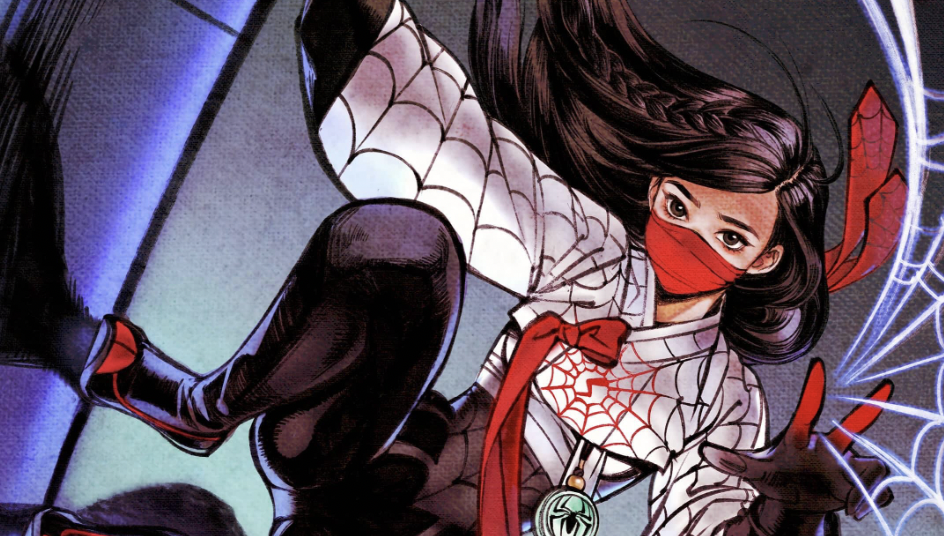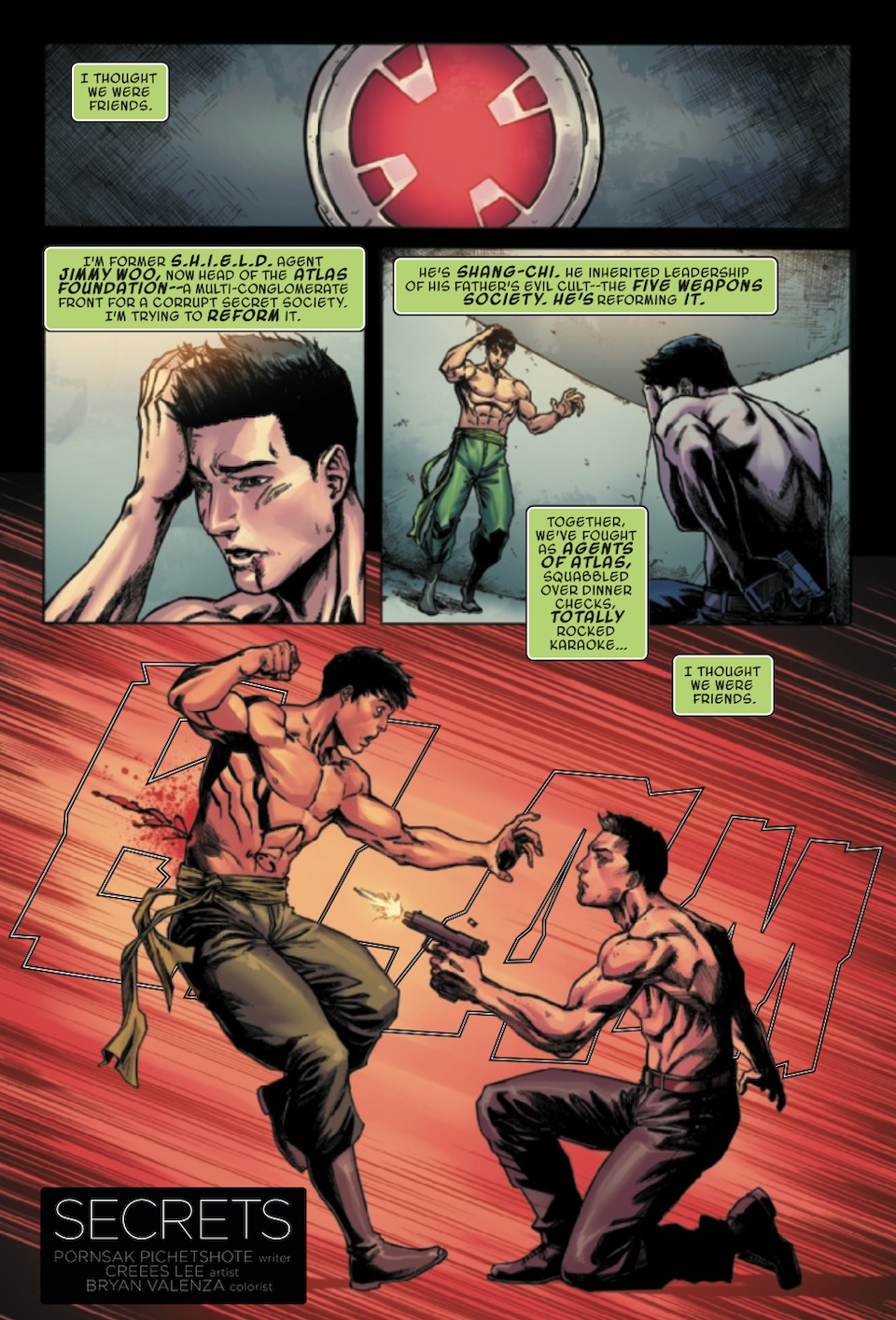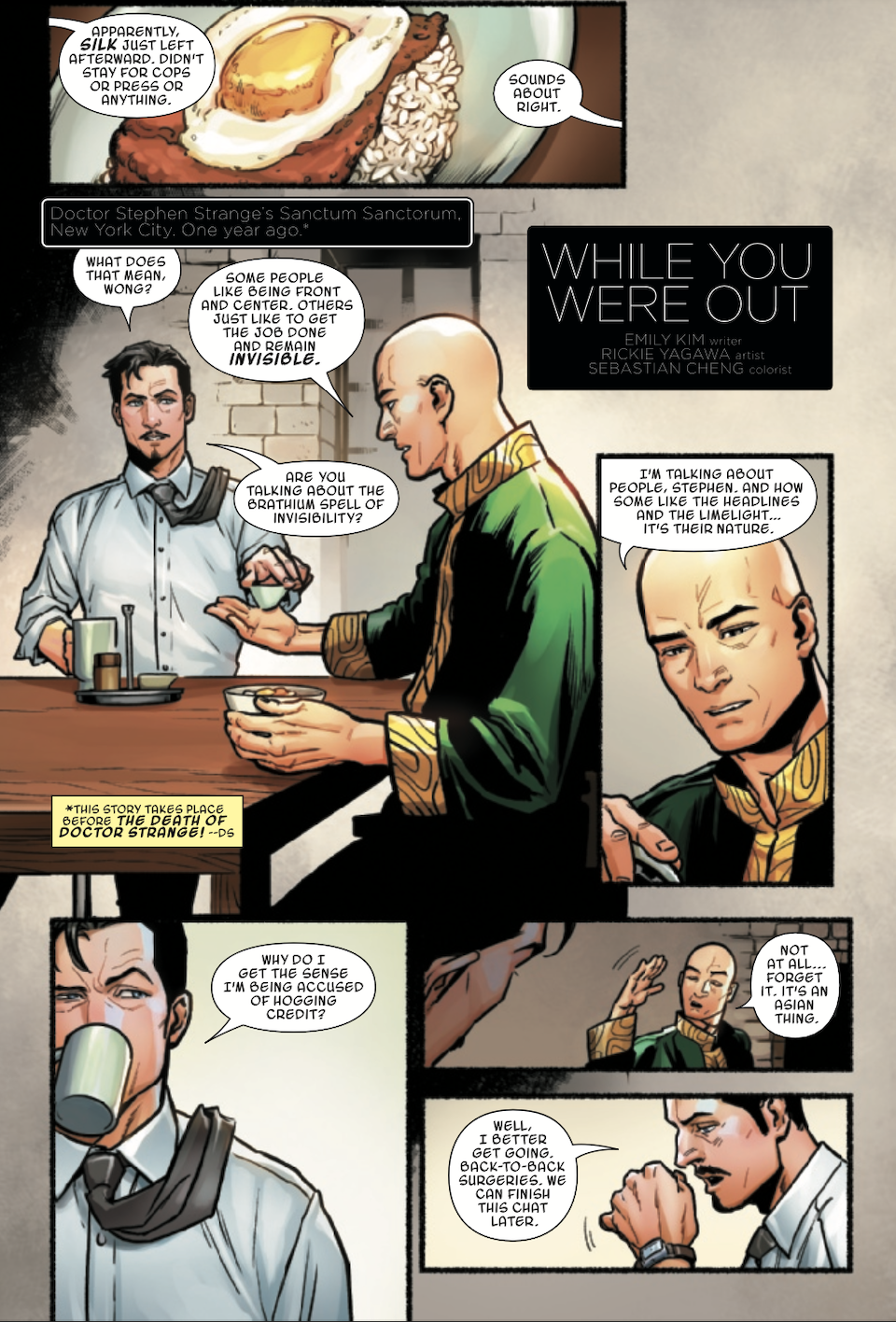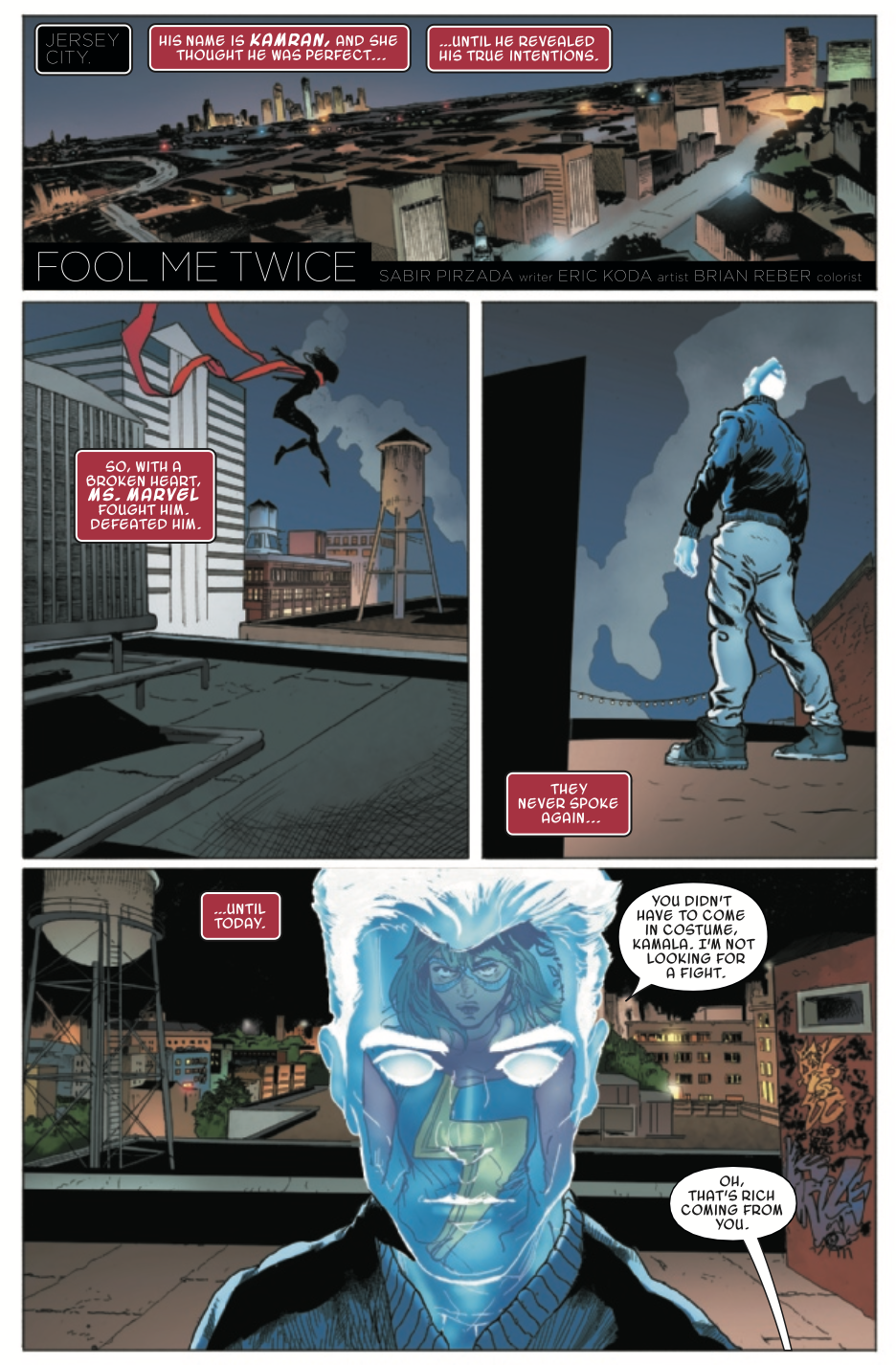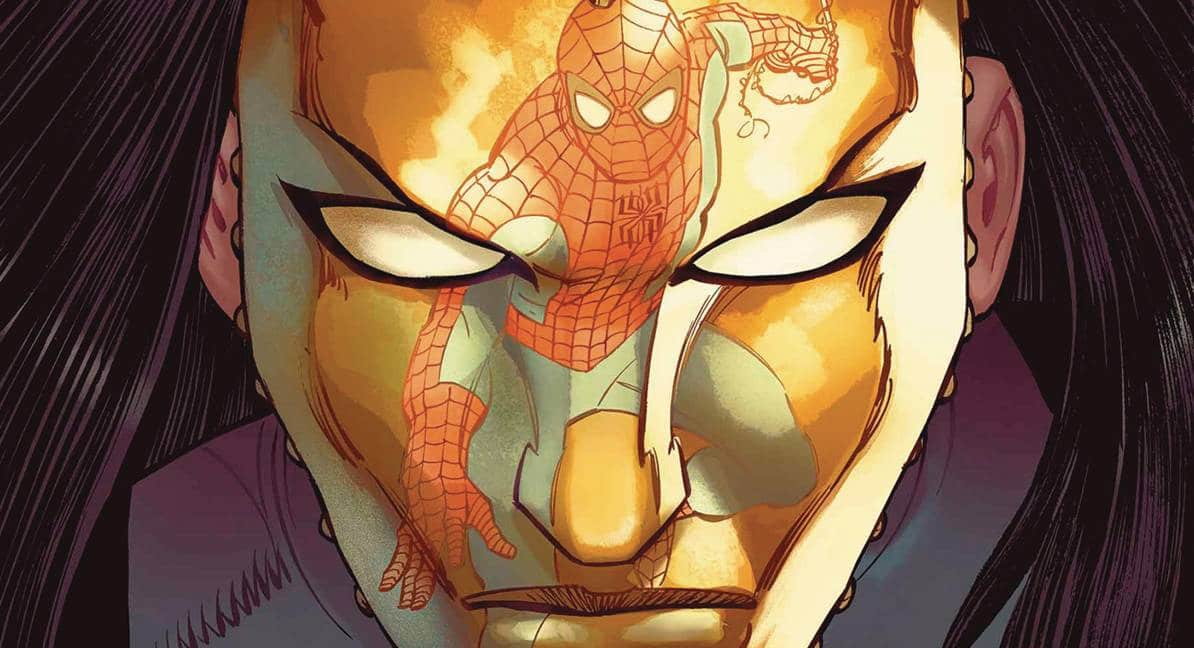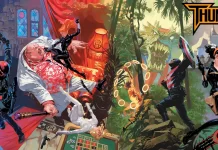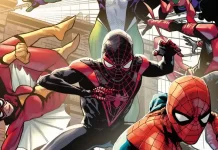Before The Beat gets to this review of Marvel’s Voices: Identity #1, we congratulate 2021’s Marvel’s Voices: Identity team for earning a Will Eisner Comic Industry Award nomination for Best Single Issue/One-Shot. The 2021 creative team included 2022 contributor Jeremy Holt and editor Darren Shan.
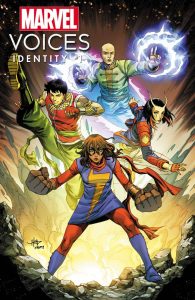
Marvel’s Voices: Identity #1
Written by: Pornsak Pichetshote, Sabir Pirzada, Jeremy Holt, and Emily Kim
Art by: Creees Lee, Eric Koda, Kei Zama, and Rickie Yagawa
Colors by: Bryan Valenza, Brian Reber, Irma Kniivila, and Sebastian Cheng
Lettering by: Travis Lanham
Designed by: Stacie Zucker
Edited by: Shan, Kat Gregorowicz, and Angélique Roché
Published by: Marvel Comics
Marvel’s Voices: Identity #1 (2022) arrived on May 18th to honor AANHPI Heritage Month with an all-new collection of stories starring Marvel Comics’ Asian heroes created by a fantastic lineup of AANHPI writers and artists. This year’s issue spotlight Shang-Chi, Ms. Marvel, Mantis, Wong, and Jimmy Woo in four action-packed and heartfelt adventures! In addition, as is customary with the Marvel’s Voices line, the anthology includes an interview conducted by Roché: this time with the lovely, loquacious Janice Chiang (learn more about the illustrious letterer here).
First up, I need a moment to be excited: because every time K-pop star and superhero Luna Snow is mentioned in a Marvel comic, I get unreasonably excited. Even if it’s a passing mention about the character’s debut in MARVEL Future Fight by Marvel’s Senior Manager of Video Game Creative Development, Isabel Hsu, in the Identity introduction. So when she appeared in “Secrets,” the first story in the anthology, I nearly exploded with rainbows (but more on her role in the story later).
“That’s the thing about going after racists. There’s no shortage of volunteers.”
Writer of “Secrets,” Pornsak Pichetshote was just nominated for an Eisner Award for Best Limited Series for The Good Asian, alongside the book’s other creators, Alexandre Tefenkgi, Lee Loughridge, and Jeff Powell. Artist Creees Lee illustrated the Pichetshote story about Shang-Chi and Jimmy Woo, who must learn to work together to bust an underground fighting ring. “Secrets” could easily fit Good Asian‘s Chinatown noir universe, and I am here for it.
Working with Shang-Chi and Woo to take down former CIA interrogator turned racist mercenary for the uber-rich, Crossfire (William Cross), are Brawn (Amadeus Cho), Ms. Marvel (Kamala Khan), Giant-Man (Raz Malhotra), Sister Dagger (Esme, Shang-Chi’s sister), Leiko Wu, and of course, Luna Snow. Hey Marvel Comics, can this be our next Avengers team?
But most importantly, the story explores identity and how that shapes our life experiences and interactions with others, sometimes subconsciously. Best summed up in the final exchange between Woo and Shang-Chi when they are talking about how coming from different cultures has impacted their friendship. Shang-Chi admits to his friend that he’s been masking himself to benefit Woo’s comfort, saying, “You’re Chinese American. And I’m Chinese. A world of difference you Americans are always so quick to forget. Maybe that’s why I’ve always tried to be the version of myself I thought an American like you would feel more comfortable with.” (The Beat‘s Therese Lacson talked about similar experiences in her review of Shang-Chi and the Legend of the Ten Rings.)
The Fame Motive
“While You Were Out,” the fourth story in the anthology, explores the superhero personality and the desire for fame. While some heroes love to be in the spotlight, others shrink from it. “It’s a distinct type, people who expect to get meaning out of fame, who believe the only way to have their lives make sense is to be famous,” Tim Kasser, a psychologist at Knox College in Galesburg, Ill., said in The New York Times. “We all need to make meaning out of our lives,” he continued, and even some superheroes are eager to be well-known and addicted to the fame that comes with being a bad-ass.
Although Marvel Comics isn’t as into the side-kick theme as DC Comics, its vault of characters includes both the fame-hungry and the timid, and Marvel often pairs these two types of heroes together. “While You Were Out” is a great example of that: Wong calls out Stephen Strange in the story’s opening conversation for wanting to be “front and center” and in the “limelight,” noting that there are other heroes who “just like to get the job done and remain invisible.” But the exchange is more than just a conversation between sorcerers; it sets up the story’s gag: Wong is the focus of the final story, and he has some world-saving to do. When a very persistent monster dressed in Girl Scout clothing arrives at the Sanctum Sanctorum to feast on the Sanctum’s mystical energy, Wong whips out some pretty nifty moves and magical artifacts (not that he wants to make a big deal of it).
There are two more stories in the anthology that are 100 percent worth checking out to support AANHPI and nonbinary creators, especially if you are looking for an intimate look into the lives of Marvel heroes. First, “The Primeval Paradox” by Jeremy Holt, Kei Zama, and Irma Kniivila spotlights the Guardians of the Galaxy’s Mantis, diving into the character’s fascinating past and setting her up for a bright future. And second, “Fool Me Twice” by Sabir Pirzada, Eric Koda, and Brian Reber sees Ms. Marvel and Shang-Chi team up in a story exploring the two heroes’ differences and similarities.


